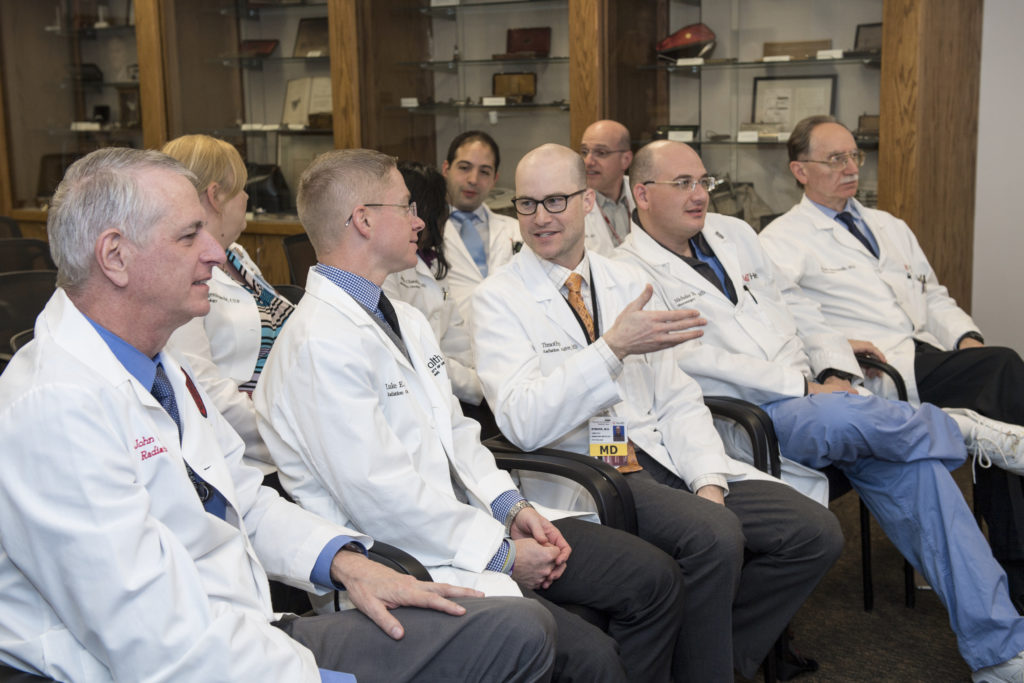
At the UC Brain Tumor Center, we begin our process of helping patients with a team analysis. Our world-renowned experts in neurosurgery, neuro-oncology, otolaryngology-head and neck surgery, neuroradiology and radiation oncology collaborate to develop treatment plans that maximize our patients’ outcomes.
Click to expand a topic below and learn more about the treatment and service offerings at the UC Brain Tumor Center:
Our team uses a variety of diagnostic tests to learn as much as possible about each patient’s brain tumor. In addition to neurologic examinations performed in the office, patients may need to undergo imaging studies or special clinical testing to help our physicians understand subtle neurologic deficits, the genetic and molecular makeup of the tumor, the tumor hotspots, the effect on normal anatomical structures, the location of critical white matter fiber tracts, the nature of tumor blood flow, and the anatomical boundaries of tumors.
Some of the most common diagnostic tests that we perform include:
Imaging Studies
- Computed Tomography (CT) Scan
- CT Myelography
- Magnetic Resonance Imaging (MRI)
- Functional MRI (fMRI)
- MRI Perfusion
- MRI Spectroscopy
- MRI Diffusion Tensor Tractography
- Positron Emission Tomography (PET) Scan
Clinical Tests
- Visual field testing
- Audiogram (hearing test)
- Electroencephalography (EEG)
- Endocrine Testing
- Lumbar Puncture
The medical and surgical management of brain tumors requires the coordinated efforts of a team of subspecialized physicians. The University of Cincinnati Brain Tumor Center hosts the region’s most comprehensive tumor board, bringing together brain tumor specialists from neurosurgery, neuro-oncology, radiation oncology, neuroradiology, neuropathology, neuro-ophthalmology, head and neck surgery, and neuroendocrinology at a weekly meeting to discuss the center’s new and established patients.
The group discusses alternate management strategies, as well as the timing and sequence of potential treatments. Our research and clinical trials groups also participate in the tumor board, ensuring that the full spectrum of options for patients are considered and made available to every patient seen by the Brain Tumor Center. When patients visit our multidisciplinary clinic, they receive a final recommendation that is backed by the entire team.
Our tumor board is also virtualized, which means that physicians from anywhere in the world can connect remotely to present cases and to request our input. Any physician interested in participating should contact the brain tumor center for information regarding how to submit cases and how to connect to the conference remotely.
Our multidisciplinary approach brings the entire team of brain tumor specialists directly to the patient at a single visit. Patients can avoid the challenges, the hassles, and the lengthy periods of time that are often associated with seeing multiple providers individually. This approach is particularly valuable for patients who travel from a distance to be treated at the UC Brain Tumor Center, because they know that they will not have to make multiple return visits just to discuss treatment options before any therapy can begin.
Each week physicians from neurosurgery, neuro-oncology, and radiation oncology see brain tumor patients at the same time and in the same location. They are joined by an extended team of physicians’ assistants, nurse practitioners, nurse navigators, and clinical trials nurses. In a single visit, patients can hear the full spectrum of treatment options and discuss the pros and cons of each approach with the same subspecialized physicians who will be performing the treatments.
Patients will also meet the team of advanced practitioners who will be helping to coordinate their long-term inpatient and outpatient care, they will be provided with education and resources specific to their condition, and they will learn about any research or clinical trials that may be available to them now or in the future.
This approach is one example of our commitment to providing an exceptional, patient-centric approach to brain tumor care.
Patients with pituitary tumors and other neuro-endocrine disorders face a unique set of challenges. Complex care coordination between neuro-endocrinologists, neurosurgeons, and head and neck surgeons is often required to provide optimal treatment, and specialized blood tests, vision tests, and head and neck examinations are often necessary before definitive treatment can occur.
In our weekly neuro-endocrine multidisciplinary clinic, the UC Brain Tumor Center brings all of these physicians and the majority of the resources necessary for performing these complex diagnostic workups together into a single clinic. Patients can talk to each of the clinicians, undergo the required tests, and leave the clinic visit with a clear plan for treatment.
The UC Brain Tumor Center is the only health system in the region that provides this type of multidisciplinary neuro-endocrine clinic experience.
Patients recovering from brain tumor surgery may stay in our state-of-the-art, Acuity-Adjustable Unit. The unit enables a patient to stay in a single room during recovery instead of moving from room to room. The room’s technologies, monitoring systems and intensity of nursing care adjust to the acuity or severity of the patient’s condition. As the patient recovers, higher-level monitoring equipment can be disconnected and removed. All rooms include a pull-out bed and are designed so that a family member can stay with his or her loved one around the clock. Also among the high-tech amenities is a purse-sized portable monitor. A patient who is ready for a walk down the hall can carry the device and continue to receive monitoring oversight.
When patients are facing complex surgery or diagnosis, our UC Neurocritical Care Program provides the most advanced resources, technology and expertise available anywhere in the world.
